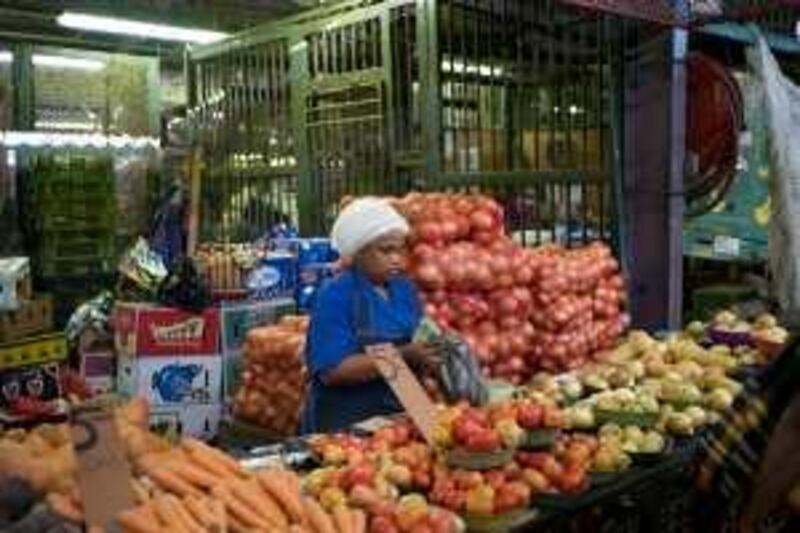DURBAN, south africa // For nearly a century, fruit and vegetables have been sold at Durban's Early Morning Market. Its metal structure is a listed as a heritage building, and under its corrugated roof, hundreds of stalls offer potatoes, tomatoes, onions and other produce in portions costing a mere five rand each - less than half the price of comparable supermarket goods, according to researchers. But it is located on a prime trading site in the city centre's Warwick Triangle, next to a giant terminal for the minibus taxis that are the standard mode of public transport for South Africa's poor, as well as bus and train stations, and more than 400,000 commuters are estimated to pass it every day. To the outrage of the traders, the Ethekwini municipality, which covers Durban and owns the site, has given them notice to quit at the end of this month to allow a shopping mall to be built. It is offering them an alternative site 300 metres away, but the traders claim that with virtually no passing trade there they will be condemned to bankruptcy. Protest banners in the 99-year-old market bear such slogans as "Our market is here to stay, our market feeds us" and "Save the market, no forced removals", while the latest in a series of protest marches was held last week. With the African National Congress, which controls the council, pledged to defend the interests of the poor, the move has prompted demonstrations, accusations of betrayal, and racism - Durban has a large Asian minority, the descendants of labourers brought in by British colonialists - and claims of questionable motives. It is a microcosm of the controversies that face the ruling party nationwide as the heady days of liberation recede into history. Four generations of Hoosen Ismail's family have worked in the market, which was reserved for Indian traders during apartheid. "I feel terrible," he said. "I started here at six years old running for my grandfather. Some people have been here for 60 years. "I'm 39 and I'm getting kicked out of the market. I will be out; I will be unemployed. It's only greed." Already those traders who cannot produce leases from the municipality have had their stalls shut down as it seeks to weaken resistance, even if, like Rose Dlamini, 41, they say they have been paying the council rent for nine years. She has seven children of her own and also looks after four nephews and nieces, but her 23-year-old daughter "went to university because of this market", she said. "Now I can't buy bread for my children. We don't want to move; I don't like how they treat us. They are supposed to talk to us. Who will shop in a mall? Only rich people. Where are our politicians now when we really need them to help?" With race still an overarching issue in South Africa, claims have been made that Indian traders are taking advantage of blacks, who now make up many of the stallholders, but Mrs Dlamini denied that was the case. "There are no problems; we stand together as one," she said. Most symbolically of all, in recent months the traders have been obliged to prove their identity to inspectors, sometimes more than once a day, to demonstrate that they are entitled to their pitches. The policy has echoes of the "pass laws" of apartheid, when blacks had to have a "pass" stating their purpose to be allowed into white areas. Since the advent of democracy 15 years ago, South Africans have not been obliged to carry such identification documents. The fact that an ANC authority has adopted such a tactic disturbed Million Phehlukwayo, deputy chairman of the Early Morning Market Association, who is also black, said: "It's very bad; that's very ridiculous to my understanding. It's the same old apartheid ... they brought it back." He blames individuals, rather than the party as a whole, but added: "Today the ANC is keeping quiet. I don't think they care about what's happening." The council said the mall project, worth 400million rand (Dh182m), was driven by a desire to improve the area for the community as a whole. "We are doing this for commuters," said Philip Sithole, head of its business support and markets unit. "The benefit is that commuters and the public will have services that they didn't have before. There will be less crime. As far as we are concerned no one is going to lose from this project." The identity checks could not be compared to apartheid and were purely to ensure that traders were legitimate, he said, and he denied making race an issue: "Some of the traders - I won't say Indian traders - are exploiting other traders." But the municipality's insistence that the mall goes ahead despite the opposition has raised suspicions among some observers that other interests are at play, even though nothing can be proved. "This is partly about big capital winning over small traders," said Caroline Skinner, urban policy programme co-ordinator for Wiego, a Harvard University-based research network, who has carried out studies in the area over the past 10 years. "Apartheid declared people they didn't want in the city as illegal and that's essentially what the city council has done here. "The city has chosen to racialise things. Given the history of racial dynamics in this city it's an incredibly dangerous thing to do. It's very depressing." sberger@thenational.ae
Outrage over closure of Asian market
Fruit and vegetable traders in Durban have been ordered to vacate a site used for the past 99 years to make way for a shopping mall.

Editor's picks
More from the national




